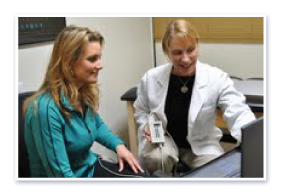Urinary & Fecal Incontinence
 Urinary incontinence and fecal incontinence refer to the accidental leakage of our body’s waste matter. How embarrassing this can be when it happens in public! Yet, with dominant factors such as giving birth, sedentary lifestyle, aging, prostate cancer or menopause, more and more Americans are finding themselves facing these problems. Incontinence is never normal. It is most often the result of weak pelvic floor muscles with overactive bladder reflexes. We are not aware of these muscles until, using biofeedback, we learn to control them.
Urinary incontinence and fecal incontinence refer to the accidental leakage of our body’s waste matter. How embarrassing this can be when it happens in public! Yet, with dominant factors such as giving birth, sedentary lifestyle, aging, prostate cancer or menopause, more and more Americans are finding themselves facing these problems. Incontinence is never normal. It is most often the result of weak pelvic floor muscles with overactive bladder reflexes. We are not aware of these muscles until, using biofeedback, we learn to control them.
How We Can Help:
Over 34 million Americans suffer in silence with incontinence problems. The shame is not in having them, but that the average woman waits 8 years to seek help. Wearing pads and adult diapers is not a solution to the problem, but physical therapy at Praxis Physical Therapy is. Praxis pioneered a successful incontinence program with over a 90% “cure” rate over the past 15 years, including the toughest cases referred to us by the University of Southern California Medical Center.
If the muscles that keep your bladder closed are weak, you may leak urine when you cough, laugh, exercise or stand up from a chair. This is called STRESS URINARY INCONTINENCE. You may often feel a strong urge to go to the bathroom, even with very little urine in your bladder. If you have difficulty waiting three to four hours between trips to the bathroom, then you have an overactive bladder, or FREQUENCY. Leaking urine on the way to the bathroom is called URGE INCONTINENCE. It is very common for some or all of these problems to occur together. The specially trained therapists at Praxis Physical Therapy also work with patients suffering from fecal incontinence and pelvic pain.
Physical Therapy
The good news is that all of these problems are treatable with physical therapy. Since your muscles can be strengthened and your bladder and bowel can be retrained, we can end your annoying “bathroom mapping” every time you leave the house. In severe cases, your doctor may also recommend medications or surgery. Physical therapy is frequently prescribed before and after surgery to maintain good surgical results.
Your physical therapy program will depend on the type of problem you have. It will include simple exercises of the pelvic floor muscles once you have “found” these hidden muscles through the aid of computerized surface EMG biofeedback (no needles!). The Pilates exercise approach at Praxis is very beneficial in targeting the specific core muscles that keep you dry during functional activities such as lifting and sneezing.
Don’t endure it, cure it! Ask your doctor to refer you to our incontinence program today. Call Praxis at: 310.548.3130.



